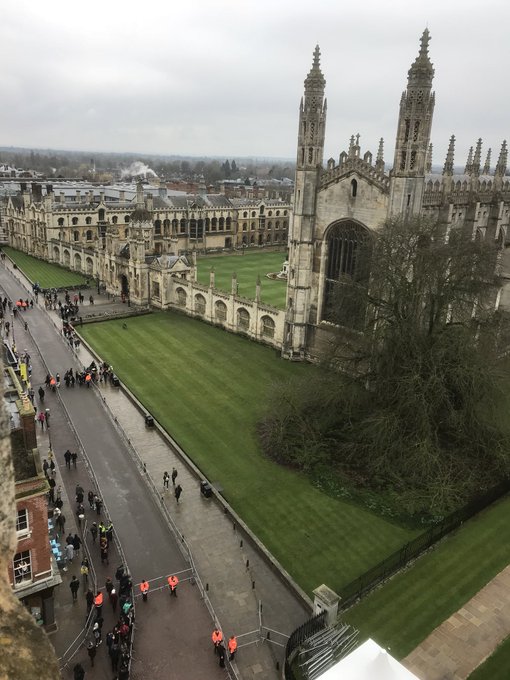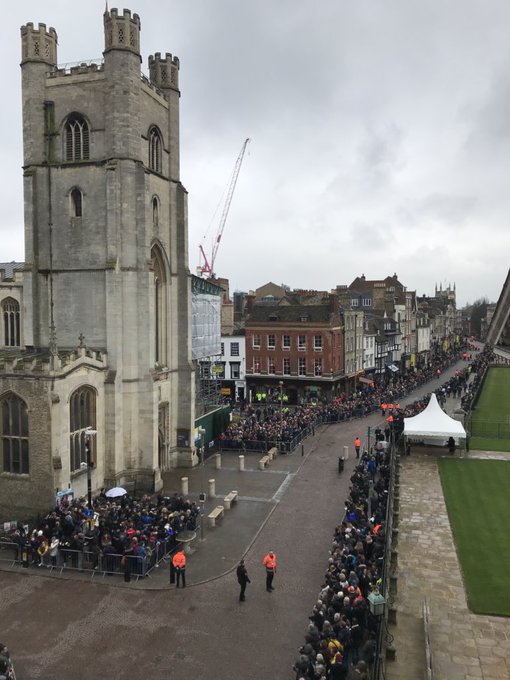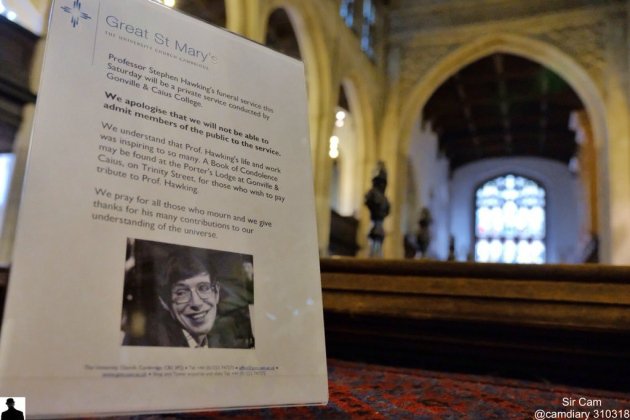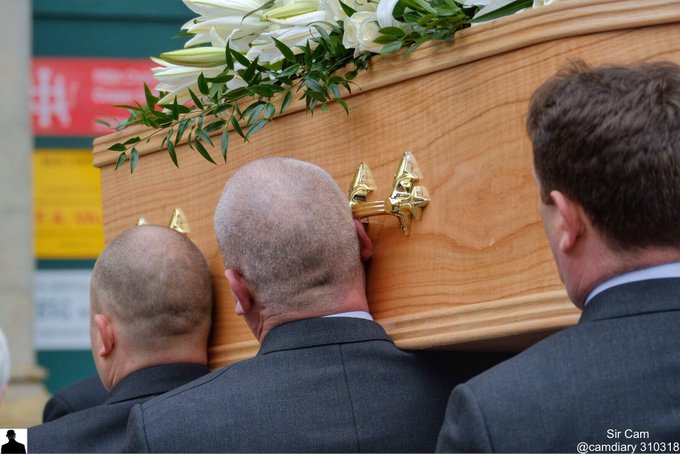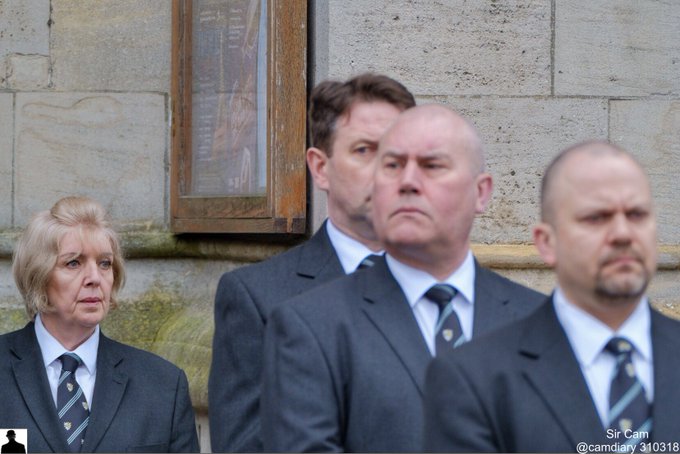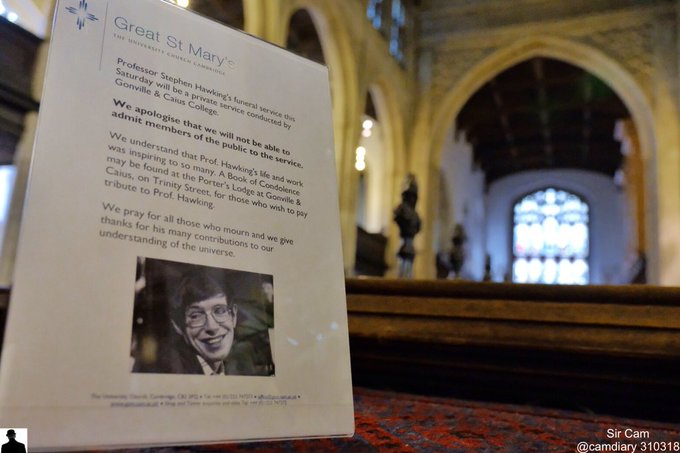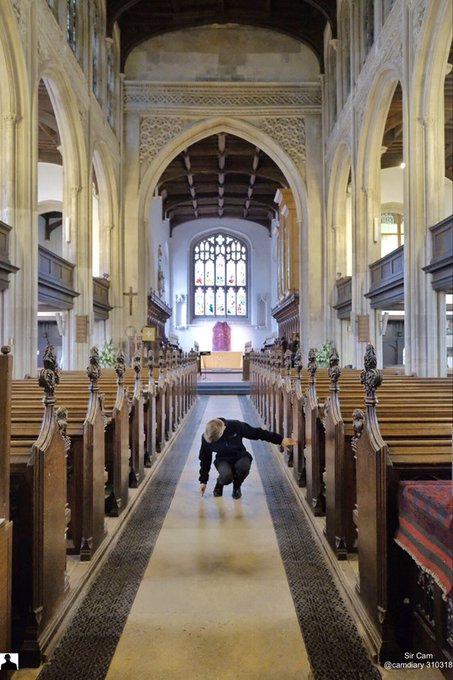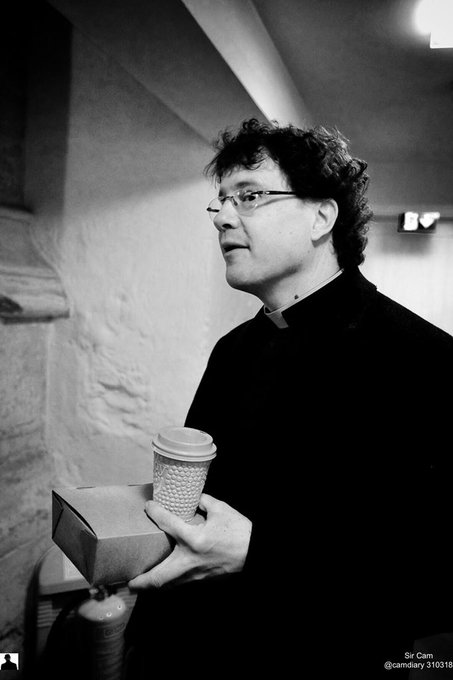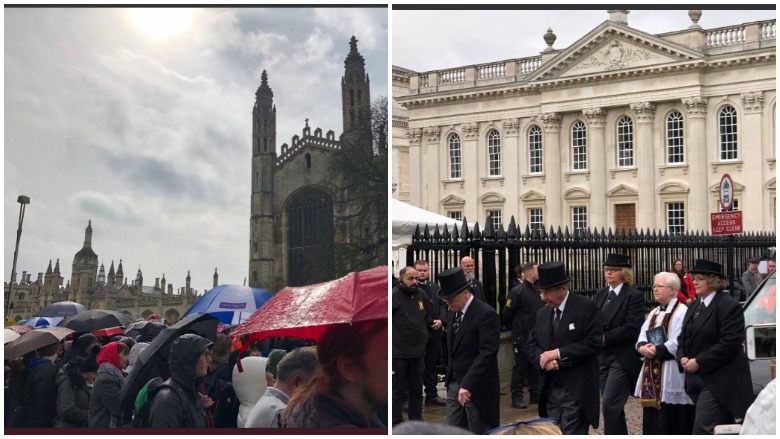
Twitter/Twitter Great St Mary\'s The funeral of Stephen Hawking at Great St Mary's Church at Cambridge University Saturday March 31.
Theoretical physicist Stephen Hawking died March 14 at age 76. His funeral was held Saturday at the Cambridge University church. His ashes will be interred along with Charles Darwin and Sir Issac Newton.
Hawking was a cosmologist, author, and his scientific works included studies on gravitational theory, black holes, and he explained the relationship between the theory of relativity and quantum mechanics. A Fellow of the Royal Society, Hawking received the US Presidential Medal of Freedom. Hawking was a professor of mathematics at Cambridge University from 1979 until 2009.
Hawking was undoubtedly the most famous modern scientist, in a wheelchair due to motor-neuron disease, he communicated with the world through a computer.
And Saturday, March 31, Hawking was memorialized at the church at Cambridge.
Here’s what you need to know:
1. Hawking’s Funeral Was Held at Cambridge University’s Great St Mary’s Church
On a rainy afternoon in Cambridge, Great St Mary’s church bells rang 76 times, one chime for each year of Hawking’s life.
https://twitter.com/camdiary/status/980025435105918976
The BBC reported his coffin, carried by porters from the college where Hawking taught and was a fellow for half a century, was covered with white lilies, to represent the universe, and another of white roses representing the polar star was placed on top of his coffin.
Hundreds of people gathered outside clapped as the hearse pulled up, the BBC reported early Saturday afternoon. But soon, there would be thousands gathered outside the church to say farewell.
2.Private Service Included 500 Invited Family, Friends, & Colleagues
Hawking said he was an atheist, but his family including adult children Lucy, Robert and Tim, said in a statement: ‘Our father lived and worked in Cambridge for over 50 years. He was an integral and highly recognisable part of the university and the city. For this reason, we have decided to hold his funeral in the city that he loved so much and which loved him. Our father’s life and work meant many things to many people, both religious and non-religious. So, the service will be both inclusive and traditional, reflecting the breadth and diversity of his life.’
The Very Reverend Dr John Hall, Dean of Westminster, said: ‘It is entirely fitting that the remains of Professor Stephen Hawking are to be buried in the Abbey, near those of distinguished fellow scientists.”
Hawking’s ashes will be interred in June near the grave of Sir Isaac Newton at Westminster Abbey. Newton was buried in the Abbey in 1727 and Charles Darwin was buried beside Newton in 1882.
The BBC reported that actress Felicity Jones, model and actress Lily Cole, Queen guitarist Brian May and comedian and Hawking documentation Dara O Briain attended.
3.Actor Eddie Redmayne Who Portrayed Hawking in ‘The Theroy of Everything’ Read from Ecclesiastes
The British actor, celebrated for his performance as Hawking in ‘The Theory of Everything,’ became friends with the Cambridge professor. Redmayne told The Independent about his first meeting with Hawking after studying him in preparation for the role.
“I found I was telling him about his own life, which was oddly useless and kept calling him ‘Professor’ when he simply wanted to be called by his first name …And I knew he would be funny but didn’t realise how funny he would be. He has this razor wit and a sense of mischief. I describe it like a glint in his eye. Like a Lord of Misrule quality. …and it’s also power. Even though it’s difficult to communicate, he runs a room. You really sense his strength.”
Redmayne won multiple awards for his performance including the Academy Award, Golden Globe and BAFTA.
Redmayne read from Ecclesiastes, which for some of a certain age may be more familiarly known from the 1960s-era rock band The Byrds’ song ‘Turn, Turn, Turn.’
“For everything there is a season, a time for every activity under heaven.
A time to be born and a time to die.A time to plant and a time to harvest.
A time to kill and a time to heal.
A time to tear down and a time to build up.
A time to cry and a time to laugh.
A time to grieve and a time to dance.
A time to scatter stones and a time to gather stones.
A time to embrace and a time to turn away.
A time to search and a time to quit searching.
A time to keep and a time to throw away.
A time to tear and a time to mend.
A time to be quiet and a time to speak.
A time to love and a time to hate.
A time for war and a time for peace.”
4.Hawking’s Son Robert, Student Professor Fay Dowker, & Astronomer Royal Martin Rees Spoke
Rees read from ‘Socrates: on Life and Death,’ (the Plato Apology) a reflection on the odyssey of life toward death.
Rees read in part, “…Now if you suppose that there is no consciousness, but a sleep like the sleep of him who is undisturbed even by dreams, death will be an unspeakable gain.”
5.Hawking Died in March After Living Decades Beyond What Doctors Expected
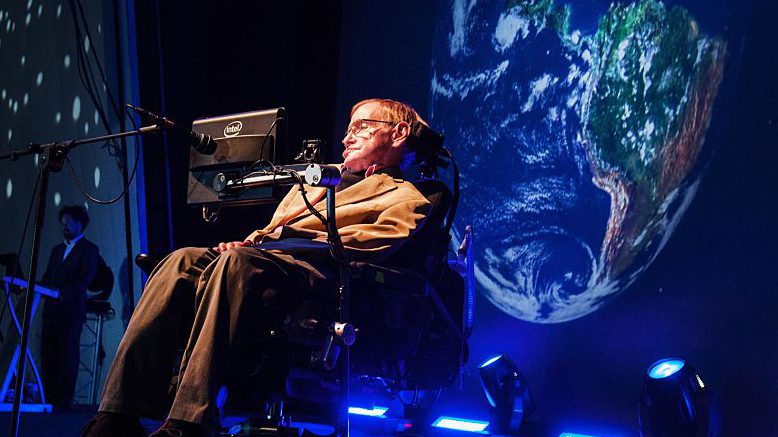
GettyBritish theoretical physicist professor Stephen Hawking gives a lecture during the Starmus Festival on the Spanish Canary island of Tenerife on September 23, 2014.
Hawking, who lived with motor-neuron disease,or amyotrophic lateral sclerosis (ALS) for decades beyond the usual life span prognosis, died on 14 March at his home.
Generally, people are diagnosed with ALS in early middle age once diagnosed are given about five years to live. Hawking was first diagnosed with the colloquial name for ALS, Lou Gehrig’s disease, when he was just 21 and a student at Oxford University. Hawking was supposed to be dead by his 25th birthday. That he lived to 76 is nothing short of staggeringly anomalous. Hawking might not have used the word miraculous, but others might.
There are many famous Hawking quotes, but perhaps this advice to his children is also an epitaph: “One, remember to look up at the stars and not down at your feet. Two, never give up work. Work gives you meaning and purpose and life is empty without it. Three, if you are lucky enough to find love, remember it is there and don’t throw it away.”
The first line of Hawking’s obituary from the BBC reads, “A man of great humour, he became a popular ambassador for science and was always careful to ensure that the general public had ready access to his work.”


